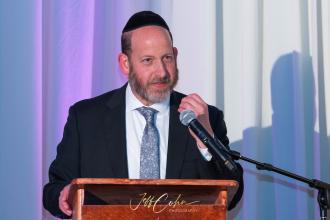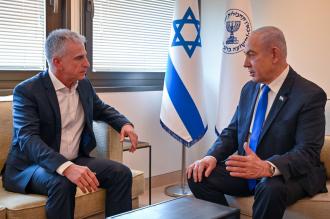President Donald Trump emphatically rejected claims Wednesday that he was disrespectful to the grieving family of a slain soldier, as the firestorm he ignited over his assertions of empathy for American service members spread into a third contentious day. “I have proof,” he insisted.
The controversy over how Trump has conducted one of the most sacred of presidential tasks generated new turmoil in the White House and left chief of staff John Kelly, a retired Marine general whose son was killed in Afghanistan, angry and frustrated at the way the issue has become politicized. It was fresh evidence of Trump’s willingness to attack any critic and do battle over the most sensitive of matters.
The aunt of an Army sergeant killed in Niger, who raised the soldier as her son, said Wednesday that Trump had shown “disrespect” to the soldier’s loved ones as he telephoned them to extend condolences as they drove to the Miami airport to receive his body. Sgt. La David Johnson was one of four American soldiers killed nearly two weeks ago in an ambush by ISIS militants; Trump called the families on Tuesday.
Rep. Frederica Wilson, a Florida Democrat who was in the car with Johnson’s family, said the president told the widow that Johnson “knew what he signed up for.” She said the president told them something along the lines of “you know this is possible when you sign up but it still hurts.”
Cowanda Jones-Johnson, who raised the soldier from age 5 after his mother died, told The Associated Press on Wednesday that the Democratic congresswoman’s account was correct.
“Yes the statement is true,” she said. “I was in the car and I heard the full conversation.
That’s simply not so, Trump said Wednesday. He declared on Twitter: “Democrat Congresswoman totally fabricated what I said to the wife of a soldier who died in action (and I have proof). Sad!”
And in a White House meeting on tax reform, Trump said that he “didn’t say what that congresswoman said, didn’t say it at all. She knows it.”
Wilson did not back down from her account, suggesting that Trump “never wants to take ownership” of a mistake.
“If you are the leader of the free world, if you are president of the United States and you want to convey sympathy to a grieving family, a grieving widow, you choose your words carefully,” Wilson told the Associated Press Wednesday. “And everyone knows that Donald Trump does not choose his words carefully.”
“She was crying for the whole time,” Wilson said of the new widow. “And the worst part of it: when he hung up you know what she turned to me and said? She said he didn’t even remember his name.”
Like presidents before him, Trump has made personal contact with some families of the fallen but not all. What’s different is that Trump, alone among them, has picked a political fight over who’s done better to honor the war dead and their families.
He placed himself at the top of the list, saying on Tuesday, “I think I’ve called every family of someone who’s died” while past presidents didn’t place such calls.
AP found relatives of four soldiers who died overseas during Trump’s presidency who said they never received calls from him. Relatives of three also said they did not get letters. And proof is plentiful that Obama and George W. Bush — saddled with far more combat casualties than the roughly two dozen so far under Trump — took painstaking steps to write, call or meet bereaved military families.
After her Army son died in an armored vehicle rollover in Syria in May, Sheila Murphy says, she got no call or letter from Trump, even as she waited months for his condolences and wrote him that “some days I don’t want to live.”
In contrast, Trump called to comfort Eddie and Aldene Lee about 10 days after their Army son was killed in an explosion while on patrol in Iraq in April. “Lovely young man,” Trump said, according to Aldene. She thought that was a beautiful word to hear about her boy, “lovely.”
Chris Baldridge, the father of Army Cpl. Dillon Baldridge who was killed in June in Afghanistan, told The Washington Post that when Trump called him, he offered him $25,000 and said he would direct his staff to establish an online fundraiser for the family. But Baldridge said it didn’t happen.
The White House said Wednesday that a check has been sent. And Trump spokeswoman Lindsay Walters said it was “disgusting” that the news media were casting his “generous and sincere gesture” in a negative light.
White House press secretary Sarah Huckabee Sanders said protocol requires that the Pentagon and White House Military Office prepare and confirm an information packet before the president contacts grieving family members, a process that can take weeks. She said Trump has made some form of contact with every family for whom he has received the appropriate information.
In private, Trump bitterly complained to associates about the flare-up, believing the press was eager to paint his response in a negative light, according to two people who recently spoke to him but were not authorized to comment publicly about private conversations. His anger was echoed from the White House briefing room podium by Sanders, who said she was “appalled” by what she described as Wilson’s efforts to politicize the tragedy.
“Just because the president said ‘your guy’ doesn’t mean he doesn’t know his name,” said Sanders. She added that while no recordings of the conversation existed, several senior officials, including Kelly, witnessed the call and described Trump’s manner as “respectful” and “very sympathetic.”
Trump’s delay in publicly discussing the men lost at Niger did not appear to be extraordinary, judging from past examples, but his politicization of the matter is. He went so far Tuesday as to cite the death of chief of staff John Kelly’s son in Afghanistan to question whether Obama had properly honored the war dead.
Kelly was a Marine general under Obama when his Marine son Robert died in 2010. “You could ask General Kelly, did he get a call from Obama?” Trump said on Fox News radio.
Sanders said Obama did not call Kelly but it was not clear if some other form of contact was made. She added that Kelly was “disgusted” the condolence calls had been politicized but said she was not certain if the chief of staff knew Trump was going to talk about his son publicly.
Two White House officials said Kelly was also frustrated that the controversy had distracted from a significant military win over the Islamic State in Raqqa, Syria.
Kelly, who was absent from a pair of public White House events on Tuesday, was sitting near the president in his tax reform meeting on Wednesday but did not address reporters.
Democrats and some former government officials were livid, accusing Trump of “inane cruelty” and a “sick game.”
Democratic Sen. Tammy Duckworth of Illinois, an Iraq veteran who lost both legs when her helicopter was attacked, said: “I just wish that this commander in chief would stop using Gold Star families as pawns in whatever sick game he’s trying to play here.”
Former Defense Secretary Chuck Hagel, who led the Pentagon for a portion of the time Kelly served as commander of U.S. Southern Command, was bitterly critical of Trump’s comments.
“If there is one sacred ground in politics it should be the ultimate sacrifices made by our military,” Hagel wrote in an email to the AP. “To use General Kelly and his family in this disgusting political way is sickening and beneath every shred of decency of presidential leadership. Beyond the dignity of the office.”
For their part, Gold Star families, which have lost members in wartime, told AP of acts of intimate kindness from Obama and Bush when those commanders in chief consoled them.
Trump initially claimed that only he among presidents made sure to call families. Obama may have done so on occasion, he said, but “other presidents did not call.”
He equivocated Tuesday as the record made plain that his characterization was false. “I don’t know,” he said of past calls. But he said his own practice was to call all families of the war dead.
But that hasn’t happened.
No White House protocol demands that presidents speak or meet with the families of Americans killed in action – an impossible task in a war’s bloodiest stages. But they often do.
Altogether some 6,900 Americans have been killed in overseas wars since the Sept. 11, 2001, attacks, the overwhelming majority under Bush and Obama.
Despite the much heavier toll on his watch – more than 800 dead each year from 2004 through 2007 – Bush wrote to all bereaved military families and met or spoke with hundreds if not thousands, said his spokesman, Freddy Ford.
Veterans groups said they had no quarrel with how presidents have recognized the fallen or their families.
“I don’t think there is any president I know of who hasn’t called families,” said Rick Weidman, co-founder and executive director of Vietnam Veterans of America. “President Obama called often and President Bush called often. They also made regular visits to Walter Reed and Bethesda Medical Center, going in the evenings and on Saturdays.”
Trump feuded with one Gold Star family during last year’s campaign, assailing the parents of slain Army Capt. Humayun Khan, who died in Iraq in 2004, after they criticized him from the stage at the Democratic National Convention.















